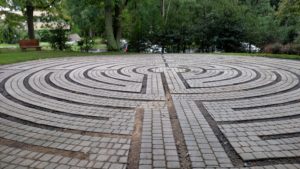
Paul of Tarsus had no warning. As he told the story later, Paul was struck down until he realized who was calling him—and blinded until he undertook his ministry. Paul’s labor on behalf of the birth of Christianity was long, but it started with one bright flash.
Most of us, I suspect, were not “blinded by the light” in quite the way Paul was. Whatever our profession or vocation, “calling” likely happened over time and on a winding road.
In his work on Flourishing in Ministry, Matthew Bloom interviewed clergy regarding their call into ministry, and discovered out two different patterns. Some clergy described their calling as “a response to an imperative from above that in its urgency, skipped all the whys and the hows.” For others, the call came “at the end of a journey of discernment involving their identity, capabilities, and convictions.”
In Calling in Today’s World, edited by Kathleen Cahalan and Douglas Schuurman, clergy members reflect on “calling” or “vocation” from eight distinct religious or secular perspectives. Rabbi Amy Eilberg, for example, observes in “Hineini (Here I Am): Jewish Reflections on Calling,” it is more common for the whole community—the people of Israel—to be called than for an individual.
Call: Essential or Organic?
One useful distinction that I would like to offer is that our sense of calling can be viewed in one of two ways: as essential or organic. An essential calling reveals a destiny that was there all along. The Jungian James Hillman’s “acorn theory” of calling, expressed in The Soul’s Code, compares our calling to an acorn that holds the pattern of the “oak” we may become.
While there may be granules of truth in this “soul’s code” view of calling, it has its limitations. I have found that being “true to my call” has often meant that as I develop and evolve as a person, so does my call. The same is true, I find, for others.
Many of my clergy clients need—after 10 years in religious leadership, at midlife, or as they approach retirement—to “re-center” their understanding of call. Re-centering means learning to understand calling not simply as what we do in a particular setting, but as part of who we are. Sometimes this means asking not just, “Who is calling?” but also “Whose calling are we living out?”
I call these moments of re-centering “sacred shifts.” At such moments, our whole narrative about who we are as a religious leader shifts. We can stop trying to fulfill some old, forlorn original template and instead follow what is wanting to emerge in us—a renewed sense of calling.
Questions for Re-centering Your Call
I offer five reflective questions as a way to help you listen to your own soul’s signals at this juncture in your ministry. I ask that you to consider responding from your whole self—from your heart, from your sensations, from your imagination—before putting your response into words:
What aspects of my religious leadership are:
- Willing: I sense that my heart is still in…
- Waning: I sense that my motivation for this is subsiding…
- Waiting: I sense I have put this on hold and that I wish I would…
- Winding up: I sense that I am actually finding new energy in…
- Winding down: I sense that I am definitely bringing this to a close…
These questions might be useful as a reflection to do alone with your journal. Or perhaps you might find a colleague or a group of colleagues to support each another in articulating your responses with open minds and compassionate hearts. In either case, may you find ways to—as the late theologian Nelle Morton used to say—practice “hearing to speech” your own inner response and the responses of others to these questions.
Once you have spent time with the questions, you might want to articulate a sense of calling that makes sense to who you are now. Perhaps such reflection can help you appreciate what David Spangler offers as a perspective on calling:
Some of the most powerful calls that we receive in our lives, the calls that come from the deepest places in ourselves, are less like summonings than like awakenings. They call us to attention.
Lawrence Peers is dedicated to serving and coaching leaders and teams from a comprehensive and integral perspective. His focus is on helping leaders be a better observer of their own leadership and of the organizations they serve in order to design skillful and reflective leadership responses. He is a Professional Certified Coach (PCC), certified Leadership Circle ® coach and Immunity to Change® and Conflict Dynamics Profile® facilitator and a Strozzi Institute Associate. He was a former director of the Pastoral Excellence Network and continues to provide training to clergy coaches and mentors. He is an adjunct professor at Lancaster Theological Seminary and Hartford International University for Religion and Peace focusing on adaptive leadership, conflict transformation and spiritually-grounded leadership.
